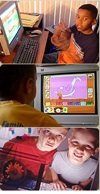MacArthur Foundation Series on Digital Media and Learning
They recently published a series of volumes with MIT Press that explore core issues facing young people in the digital world and are available online for free download or for purchase as hard copy.
There are six series topics, and they include:
Civic engagement
This book looks at politics and civic life from the standpoint new generations of young people who have grown up living substantial portions of their lives online: seeking entertainment, social relationships, and expression. Even as it is clear that participation in online communities is important for most young people, it is less clear how, or how often, this translates into public voice or political participation.
MIT Press downloads: Civic Life Online: Learning How Digital Media Can Engage Youth
Credibility
This volume addresses the of credibility—the objective and subjective components of the believability of a source or message—in the contemporary media environment, with a particular emphasis on youth audiences and experiences. While research on credibility and new media is burgeoning, extremely little of it focuses on any user groups younger than college students. Therefore, the goal of the volume is to fill this void by drawing out the research, policy, and educational implications of credibility for youth and learning as a way to set the agenda for future work in this area.
MIT Press downloads: Digital Media, Youth, and Credibility
Ecology of games
Although there has been a considerable amount written on games and young people’s use of them, there has been little work done to establish an overall “ecology” of gaming, game design, and play—in the sense of how all of the various elements, from code to social practices to aesthetics, cohabit and populate the game world. In this volume, we seek to explore the design and behavior of games as systems in which young people participate, as gamers, producers, and learners.
MIT Press downloads: The Ecology of Games: Connecting Youth, Games, and Learning
Innovative uses & unexpected outcomes
This volume identifies core issues for further study concerning how young people’s use of digital media may lead to various innovations and unexpected outcomes, including a range of unintended learning experiences and unanticipated social encounters. While such outcomes might typically be seen as ‘positive’ or ‘negative,’ this volume aims to push beyond simple accounts of digital media and learning as either utopian or dystopian in order to explore a complex variety of emergent practices and developments.
MIT Press downloads: Digital Young, Innovation, and the Unexpected
Race & ethnicity
This volume addresses themes that include but are not limited to: How race and ethnicity intersected with post 9-ll political economies, and today’s online hate-speech pratices (direct and indirect)? What is the significance of race and ethnicity in digital youth and music cultures? Where do we stand on matters of universal access (class matters) and the racial and ethnic digital divide in the 21st century, especially in terms of digital media learning (DML) and youth?
MIT Press downloads: Learning Race and Ethnicity: Youth and Digital Media
Identity
This volume addresses the consequences of digital media for young people’s sense of self and others, and for their involvement in familial, recreational, educational and civic activities. It explores how young people use these media to interact with each other and with unknown (and potentially global) audiences; and the implications of these interactions for the development of individual and social identities. It considers how young people are using digital media to share their ideas and creative productions, and to participate in networks that are small and large, local and global, intimate and anonymous. It looks at the emergence of new genres and forms of communication and self-expression, from SMS and instant messaging to home-pages, blogs and social networking sites.
MIT Press downloads: Youth, Identity, and Digital Media




